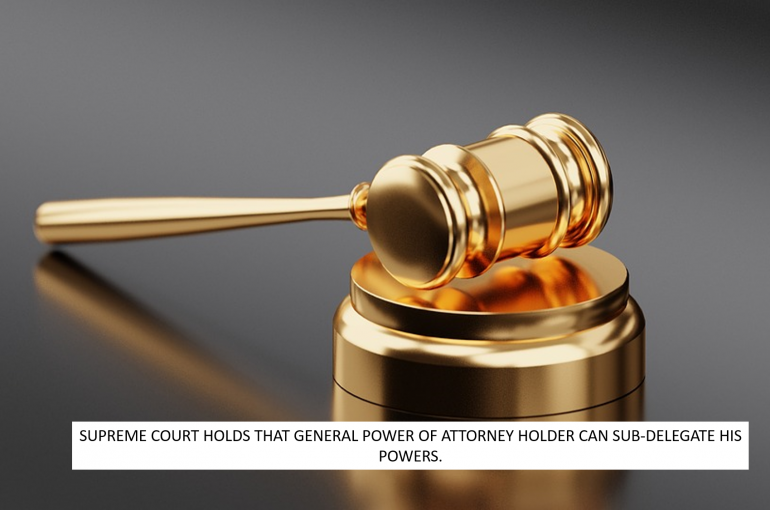SUPREME COURT HOLDS THAT GENERAL POWER OF ATTORNEY HOLDER CAN SUB-DELEGATE HIS POWERS
Recently, a two-Judge Bench of the Supreme Court comprising Justice V Ramasubramanian and Justice Pankaj Mithal passed a Judgment dated 20.02.2023 in Mita India Pvt Ltd vs Mahendra Jain in Special Leave Petition (Crl.) No.6220 OF 2019, and held that a General Power of Attorney holder can sub-delegate his powers to another person if there is a specific clause authorizing sub-delegation.
FACTS
The Appellant-Company, M/s. Mita India Pvt. Ltd. awarded a Contract to the Respondent – Mahendra Jain for shifting of 33 K.V. electrical overhead line at its plant at Dewas, wherein, the Appellant-Company by mistake made an excess payment to the Respondent. The Respondent agreed to refund the excess amount and issued two cheques to the Appellant-Company for its refund. The cheques were dishonoured on account of instructions “stop payment”.
The Appellant-Company through its Authorised Representative Ripanjit Singh Kohli filed a Complaint in the Court of Chief Judicial Magistrate, Dewas under Section 138 (Dishonour of cheque for insufficiency, etc., of funds in the account) read with Section 141 (Offences by companies) / 142 (Cognizance of offences) of the Negotiable Instruments Act, 1881. In the said Complaint, Respondent moved two Applications – first alleging that the Complaint has not been filed by an Authorised Person and the second alleging that Kavinder Singh Anand cannot depose before the Court as the Complaint nowhere states that he is having knowledge about the facts and the transactions.
The first Application was rejected by the trial Court vide Order dated 30.01.2018. The second Application was rejected vide Order dated 23.07.2018 whereupon a Criminal Revision Petition was filed which was also dismissed vide Order dated 26.09.2018. These three Orders were assailed by the Respondent by invoking jurisdiction under Section 482 Cr.P.C (Saving of inherent powers of High Court). The Madhya Pradesh High Court allowed the Petition filed under Section 482 Cr.P.C., wherein the Court ordered for setting aside of the above Orders on the ground that the Complaint was not filed by the person authorised as Kavinder Singh Anand, who was given the Power of Attorney, had no authority of law to sub-delegate the said power to the authorised representative Ripanjit Singh Kohli. It was further held and ordered that Kavinder Singh Anand is not authorised to depose on behalf of the company.
ISSUES
i) Whether a Complaint filed by a Company through its authorized representative was maintainable or not?
ii) Whether Kavinder Singh Anand was qualified to testify on behalf of the Appellant Company?
REASONING AND ANALYSIS
Aggrieved by the aforementioned Order dated 04.04.2019 of the Madhya Pradesh High Court, the Appellant moved the Supreme Court under Article 136 of the Constitution of India (Special leave to appeal by the Supreme Court).
With respect to the first issue, the Apex Court relied on its judgment, A.C. Narayanan v. State of Maharashtra and Another (2014) 11 SCC 790, wherein the following principles were laid down:
- “Filing of a Complaint under Section 138 Negotiable Instruments Act, 1881 through power of attorney holder is perfectly legal provided he has due knowledge about the transaction (s) in question;
- Power of attorney holder can depose and verify on oath to prove the contents of the Complaint if he has witnessed the transaction;
- The Complaint filed through power of attorney holder must contain an assertion/ that he had the knowledge about transactions in question;
- Functions under general power of attorney cannot be delegated to another person without a specific clause permitting the same in the general power of attorney.
- The affidavits of complainant, his witnesses or his power of attorney holder are permissible and sufficient for taking cognizance on the Complaint; and
- The Complaint by power of attorney holder on behalf of the original complainant is maintainable though he cannot file a Complaint in his own name.”
In present case, the Apex Court disapproved of the High Court’s approach and observed with respect to the first issue that:
“The law is settled that though the general power of attorney holder cannot delegate his powers to another person but the same can be delegated when there is a specific clause permitting sub-delegation”
With respect to the second issue, the Court noted that Anand was one of the Directors and had filed an affidavit stating that he has direct knowledge about the transaction.
“As the power of attorney holder is said to be having due knowledge about the transactions, he has the capacity to depose and the trial Court or the Revisional Court committed no error of law in rejecting the applications of the Respondent”,
Conclusion
Thus, based on the aforesaid observations, the Apex Court allowed the appeal and quashed the Order dated 04.04.2019 of the Madhya Pradesh High Court and the Orders of the Trial Court and the Revisional Court were restored. The Apex Court held that the General Power of Attorney had specifically authorized Anand to appoint counsels or special attorneys and on interpreting the clauses of the Power of Attorney, it was found that there was authorization to Anand to appoint not only lawyers but also special attorneys for related purposes. Moreover, the Court further held that Anand that was one of the Directors of the Company who has been specifically authorised to lodge the Complaint and to pursue it and since he is also a Director, he is fully conversant with the facts of the case and hence is competent to pursue the litigation on behalf of the Appellant Company, which the Madhya Pradesh High Court had very conveniently ignored.
Devashish Kakkar
Legal Associate
The Indian Lawyer





































Leave a Reply